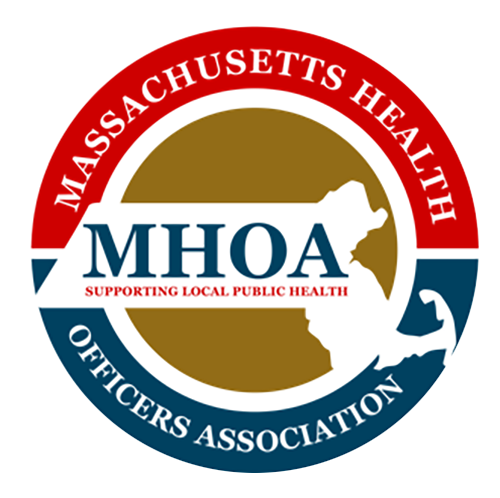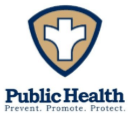Complete Story
08/18/2021
MHOA Member Spotlight – Jessica Tracy
By Mingrui Wei
By Mingrui Wei
Jessica Tracy is a public health nurse of the Dedham Health Department and has over ten years of experience in the field of public health. Starting as an animal control officer, Jessica wanted to educate the community on animal health and welfare after witnessing at a vet clinic, how people wrongfully treat their pets. During that time as an inspector dealing with animals and housing, she sensed that people needed assistance with many other bigger problems at the community level. She stated, “Prevention is more important to me than treating”, and that is one of the reasons why she decided to step into the field of public health instead of being a hospital nurse. “If we take the time to prevent disease and disparities, we can prevent and eliminate many issues.”
Jessica is currently enrolled in the Master of Public Health program nursing track at Worcester State University — the only public health nursing program offered in the state — and is expecting to graduate in May 2022. Public health nursing is a special track that few people understand or recognize. Public health nurses are less identifiable than hospital nurses since they focus on population health and identifying community needs rather than treating individual patients. “It’s very difficult to come from bedside nursing into population health without training, resources, and guidance”, said Jessica, “I’m in this program to educate myself and give me the status needed to advocate for the profession, which in turn will advocate for communities.” As there is only one public health nursing specialty program in the state, Jessica has emphasized the priority to advocate for professional public health nursing through awareness and education. “We are still on a local level and we have to continue to advocate for and educate the general public on what we do”, she said.
Jessica has won the MHOA Amy Naparstek Memorial Scholarship of this year, which celebrates her continuing excellent work in public health. As a public health nurse and a member of the Massachusetts Association of Public Health Nurses (MAPHN), Jessica has been collaborating on the MAPHN Strategic Plan, a five-year plan to improve public health nursing through advocacy awareness, education, and training. In addition, she is a proponent Special Commission on Local and Regional Public Health Recommendations for Improved Effectiveness and Efficiency of Local Public Health Protections in the Commonwealth. Jessica serves on the MAPHN Outreach Visibility and Membership Committee to initiate the goals and interventions of the MAPHN Strategic Plan that will coincide with the Blueprint for Public Health Excellence project.
At the Dedham Health Department, Jessica takes on multiple responsibilities for different services. She is in charge of the surveillance programs of communicable diseases and tuberculosis, and works with organizations to bring clinics to the Dedham community. Identifying population-based health disparities, conducting emergency preparedness civilian training and immunization clinics, as well as inspection duties, are all part of her work responsibilities. After the COVID pandemic hit hard in Massachusetts, the priority of the department shifted to COVID-related work, with limited other regulatory functions but still able to conduct flu and covid-19 immunization clinics and communicable disease surveillance.
During this COVID pandemic, Jessica took on the lead role of the Dedham Health Department Covid-19 response. Covid-19 related response was the focus for the Public Health Nurse, including recruitment, partnering, and training of Dedham School Nurse staff and Dedham MRC volunteers for covid-19 contact tracing in the community. Contact tracing includes notifying contacts of exposure, addressing questions and concerns, referring for SARS-CoV-2 testing, encouraging self-quarantine, monitoring of symptoms, and assessing the need for additional supportive services in our community during isolation and quarantine periods. Liaison between the Health Department and many businesses, families or community partners on covid-19 related topics or investigations. Developing a plan for covid-19 vaccine dispensing in the community including ensuring compliance with the Massachusetts Department of Public Health (MDPH) vaccine program, reporting requirements, training, and recruitment of volunteers.
She was in charge of overseeing contact tracing and related volunteer training to facilitate programs, and she also acted as a resource for both residents and businesses. During this process, MHOA took on the role of assisting local health departments with their COVID-19 responses, ensuring effective communications between local and state health departments, and ensuring the accessibility of resources, training, and information to help the communities on a local level. As the town of Dedham is slowly getting back to normalcy with businesses and lives, they are once again identifying the needs of the community and looking for available resources and programs that took the backseat during the pandemic.
As an MHOA member for more than 5 years, Jessica enjoys her experience with MHOA and all the resources they provide. Online and in-person training, annual conferences, and the state-wide network help her to connect with people in the public health field, “It’s really valuable to see what everybody is doing. If you are only bouncing ideas off 10 people, you might have very different outcomes.” Moving forward, Jessica thinks it is important for MHOA and other professional organizations to work together to advocate for standard training offered to public health specialties, such as public health nurses, inspectors, and health directors that are mandated on the state level. Currently, the only position that is required to be licensed is public health nurses in health departments, and that should not be the case since hypothetically people with high school diplomas can be hired as health directors with the lack of qualification or training for the position. Specific funding should also be issued to towns and cities, ensuring them with equal ability to hire or train quality staff with standard practice. Lastly, having more educational opportunities would mean more quality healthcare in all communities. Jessica ends with, “The local public health professionals are doing the same things as public servants to help the public, and every community should get the same outcomes and opportunities from high-quality services. There is still a lot to be done.”
Although expecting herself to switch to the state or federal departments at some point, Jessica is pretty happy right now with her work at the local level. She reflects, “I like the local level, I think we can do a lot on the local level for communities. It’s also nice to know the people that you work and live with.” Looking forward to the future, her work priority will focus on summing up the experience from this pandemic and planning a more effective response ahead to prepare for the next pandemic.


